Reviews
Stanley Kramer
USA, 1959
Credits
Review by Briallen Hopper
Posted on 05 August 2013
Source MGM DVD
Categories Favorites: The Apocalypse
Every generation has its own impending apocalypse. I grew up fearing nuclear war with Russia, and now that I’m older I fear melting icecaps, volatile weather, and New York City underwater. But however unpleasant the apocalypse was to think about during the Cold War, it was never as inevitable as it may now feel.
For the characters in On the Beach, though, the apocalypse is a done deal. World War III has ended, and all life north of Australia has apparently been wiped out. Now everyone in Melbourne is waiting for the radiation to arrive on the air. They have maybe a few months.
This is a decidedly unspectacular apocalypse movie. The most chilling special effects are quiet images of empty public space. There are no corpses. Instead of seeing mushroom clouds, we watch the psychological struggle of survivors.
Some take refuge in ritual. Anthony Perkins plays Peter Holmes, a sensitive Australian naval officer who still enjoys the domestic routine of feeding his baby daughter, while trying to avoid looking at the calendar on the wall; meanwhile the old men at an Anglophile club continue to complain about the oversights of the wine committee and the club waiter makes sure the portraits on the wall stay straight. Ava Gardner plays the ravishing Moira Davidson, who turns to alcohol and sex, while Fred Astaire plays the guilt-racked physicist Julian Osborne, who turns to alcohol and fast cars. The most wrenching cases are those of flat denial. Peter’s wife Mary, played by Donna Anderson, insists, “There is hope! There has to be hope! There’s always hope!” before retreating into a catatonic depression. More chilling still is Gregory Peck’s impassive American submarine commander Dwight Towers. When Moira tells him “You look married,” he says, in an inaccurate present tense, “Oh, I am! My wife’s name is Sharon. I have a couple of kids: Richard, 8; Helen, 5. Dick is the real sailor of the family. He is going to go to Annapolis…”
Even in the interminable anti-climax, there are plots. One narrative involves Dwight’s submarine going to the US in a probably doomed search for signs of life. Another involves Moira, Julian, Mary, and Dwight learning how to face up to loss and come back to life before they die. This is not easy. When Dwight’s facade finally cracks, he is almost heaving with grief. It seems that the process of facing the end is surprisingly undignified and hot; the antidote for apocalypse turns out to be excesses of love and slapstick. There are multiple sexy spankings and wrestling matches. Dwight falls in the water twice. Dwight and Moira run into each other’s arms twice. Their kisses are slowly savored from almost every angle. Ernest Gold’s jarring and effective soundtrack provides a humane commentary on each of these human and post-human narratives: the scenes with people, even in the shadow of death, are set to implausibly comic or romantic music, while the scenes without people sound like silence or screeches.
It is perhaps these mixed moods of denial and resignation, of absurdity and quotidian comfort and unprecedented tragedy held at bay, that make this cinematic apocalypse feel so modern. I love Dr. Strangelove as much as the next girl; I have watched it over and over again, and it has a lot to tell us about the American war machine in the modern era. But for the uncanny feeling of daily life after the damage has already been done, On the Beach is best.
More Favorites: The Apocalypse
-

The War Game
1965 -
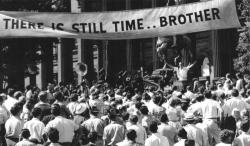
On The Beach
1959 -
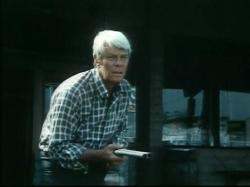
Where Have All the People Gone
1974 -

A Boy and His Dog
1975 -
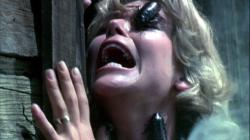
Bug
1975 -
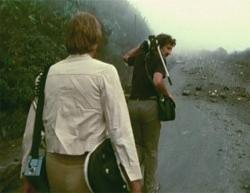
La Soufrière
1977 -

Escape from New York
1981 -

The Road Warrior
1981 -

Le Dernier Combat
1983 -

Night of the Comet
1984 -

Threads
1984 -

The Terminator
1984 -

Def-Con 4
1984 -
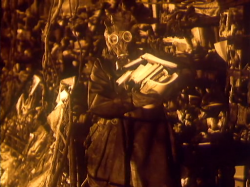
Letters From a Dead Man
1986 -
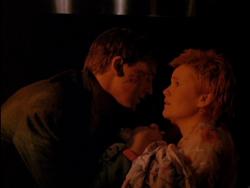
Miracle Mile
1988 -

Last Night
1988 -

Last Days
2005 -

The Rapture
1991 -

Southland Tales
2006 -

Idiocracy
2006 -

The Happening
2008 -

The Road
2009 -
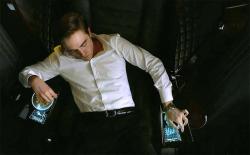
Cosmopolis
2012
We don’t do comments anymore, but you may contact us here or find us on Twitter or Facebook.



